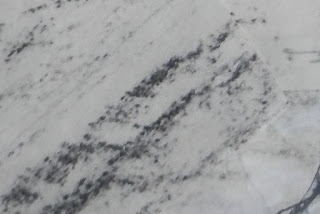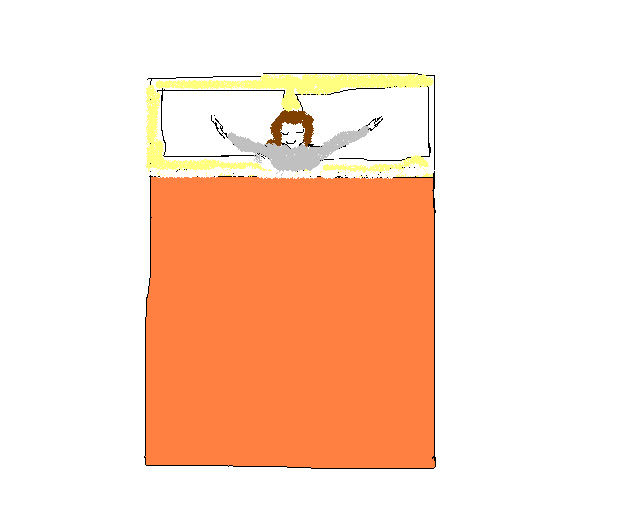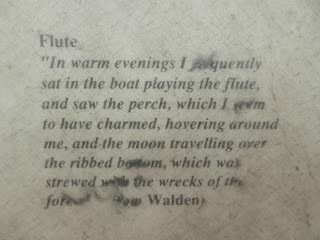 |
| photo by awyn |
Now there's this trumpet-player, Henrik, come out of the sickbay at last. . . . Cadaverous, sallow man, with cropped grey hair and big moulting brown eyes that weaken his mouth as they move.
. . . . .
Horsehair, the padding of an old chair, pulled out in a flat tangle. Sometimes a man's star stains like a cigarette burn on yellow wood.
Suffering and love in Henrik's eyes. A thinking love. Temptation to make him happy, then outwit him.
~ ~ From Roy Fisher's
The Ship's Orchestra (London: Fulcrum Press, 1966).
One of the least known of Fisher's works, and one of his two favorites, this book is comprised of short "prose units" intended as "extended compositions" to catch a particular kind of discourse and tone--"controlled, but at the same time as wacky as I wanted it to be", says the author in an interview with John Tranter.
[Source]
I was intrigued by the book's title and description. "A poet of international reputation has broken through the barrier between poetry and prose with this disturbing and original volume." (Quote from the book's jacket, in 1966.)
Where did the idea of "The Ship's Orchestra" come from? I wondered. It reads somewhat like the recollection of a dream--or possibly, nightmare.
It was inspired, Fisher said, by Picasso's painting "Three Musicians".
"What kind of band is this?’ Fisher asked himself. [Fisher made his living as a member of a band.]
So I looked at this, and after a bit something which was nothing whatever to do with them came up. It was the idea of a completely confused sort of Kafkaesque set of people with their own comedy, on a ship.
A story without a beginning or an end, a "Kafkaesque or Beckettesque fable, of people who are musicians but don't play. So who are they?" Fisher asks. "Is it musicians that they are? What is it to be a musician who is not called upon to play?"
"And then they fictionalized themselves, and turned into characters," he added.
What does it mean to be a writer who doesn't write? And how exactly do ideas or images that just sort of "come up" when we look at something, go "fictionalize themselves" and turn into characters?
So here’s the beginning of The Ship’s Orchestra. The character who’s speaking is the piano player in the band. The whole thing takes place in his consciousness. He’s
an indeterminate sort of character. You don’t know much about him
except the way he sees things. He may or may not be sober, he
may or may not be telling the truth. He may or may not know whether
he’s telling the truth or not. [Excerpts from interview, "Roy Fisher, In Conversation with John Tranter", in Jacket I (September, 2001).
In his early twenties, Fisher became interested in the ways dreams unfold and would write his dreams down, "with great care", night after night. He described them as "beautifully written." In contrast to his poems, which he said were penned "with enormous sweat . . . appallingly written, and full of bombast."
The Ship's Orchestra was an experiment, a kind of writing he admits was "unusual" for him at the time.
"
What is it to be a musician who is not called upon to play?" he'd asked in that interview with John Tranter. (What is it like to be a writer who is not called upon? Is a poet who hasn't been called upon in twenty years and has stopped writing poems still a poet? Musicians who've stopped making music/ writers who write only for themselves/ painters who no longer paint--what are they? Formers? Retireds? On temporary or permanent hiatus?")
The jacket blurb calls the book a "barrier breaker between poetry and prose", a disturbing, surreal
journey through a tunnel, in prolonged darkness--not exactly nightmare, more like slipping into a dream, one foot still in reality, both worlds merging into this bizarre experience you struggle to make sense of.
Time has stopped here. "The ship does not proceed on its cruise, but opens and closes itself while remaining in one spot." An apt description of how I felt at the end of reading it. An almost 60-page book of compositional vignettes in the form of "prose units"--that read like someone taking notes, registering reactions. The character's observations (I can imagine them as journal entries) sometimes choppy, staccato-like. It reads like a report: This happened. That happened. I did this. I did that. Here's what I notice. Here's what I don't understand. No reflection, just unpursued wonderings. "Someone's playing with my perceptions", the narrator murmurs at one point.
I found the concept intriguing, some of the images compelling, the format enticing. But once the style was established, it became a little too . . . predictable. It took me out of the scene, so to speak, and suddenly had me looking in from the outside, noting the how of the writing instead of becoming absorbed in the content.
Akin to being stuck in a carnival fun-house with no exit, its enactment on the page nevertheless registered as an interesting experiment in verse that might be duplicated, albeit with a different style of writing.
(Maybe "style's" the wrong word here. Authentic for the narrator, perhaps, but it became a bit one-dimensional. I kept wanting to climb outside the character's mindset, explore the ship a bit on my own, get to see some of the other characters more than just through
his eyes. Maybe I ask too much of words on a page. I was becoming impatient, feeling as 'stuck' as the narrator. Maybe that was the point--to put the reader in the narrator's shoes.)
Disclaimer: This is not a book review. To do a proper book review, one should know something about the author, and before I'd picked up this book I'd never heard of Roy Fisher. I had to google him, which is how I found the John Tranter interview. I actually found that interview more interesting than the book, because it brought up questions I myself have asked, it offered a glimpse into how and why one chooses to write, and the creative process in general, not just for writers but musicians and painters as well. Too many book reviews put too much emphasis on the poet/writer's reputation (or lack thereof), what school/ movement/genre he/she is associated with, and the inevitable comparison to others, not to mention detailed analysis of individual lines. I'm not equipped or knowledgeable enough to do that, so have just given my personal impression based on a single reading.
Sometimes you stumble on a poem or piece of writing knowing nothing about its creator, later to learn it falls into a categorical niche you normally don't ascribe to. I'm not a big fan of rap music, for example, it puts me into a kind of trance where my mind suddenly starts searching for the Exit door, but I recently searched for, and listened to, a particular rap performance by a young Quebecois poet whose written poetry I'd stumbled upon at a booth at our local annual
Salon du Livres in March, whose words jumped out from the page and spoke to me. Turns out he works with a suicide prevention organization and uses his poetry to speak to youths, in a venue they could relate to, to try to convince them life is worth living. In the end it was the words themselves, not their method of transmission, that won me over.
So thank you, Roy Fisher, for sharing (via John Tranter) your views on the creative process and for the little trip with "The Ship's Orchestra." For the idea of experimenting with a fictional story told in "verse units" (which may solve a problem I'm having resuscitating a neglected novel-to-be, gone seriously mothbolly). For challenging me to experiment with verse, as you have done . And inadvertently, for introducing me, however roundaboutably, to the work of John Tranter.
 |
| Feng Zhu Design |
I still get flashimages of that pianist locked in the bowels of the ship, wandering about confused, taking mental notes, reminding me of that oft-repeated question "What kind of thing is
this? (applicable to just about anything). And the too-too-familiar image of the "suffering and love in someone's eyes" (in Fisher's book, it was "Henrik"); and the concept of a "thinking love".
Another day in the life of words--
stumbled on,
spent time with,
released,
remembered.
This (scenario) would make a terrific one-act play. Imagine! Six poets trapped on a barge in the middle of the ocean,
sans paper or pen or computer, duration of voyage and destination unknown. What interesting versed recallings might later emerge and find their way to readers' eyes!
More about Roy Fisher's poetry, reviewed, with examples::
http://www.leafepress.com/litter1/baker02/fisher%20review.html
http://humanities.uchicago.edu/orgs/review/57-1,%20Morrissey.pdf
http://www.guardian.co.uk/books/2010/jun/26/standard-midland-roy-fisher-review
























































